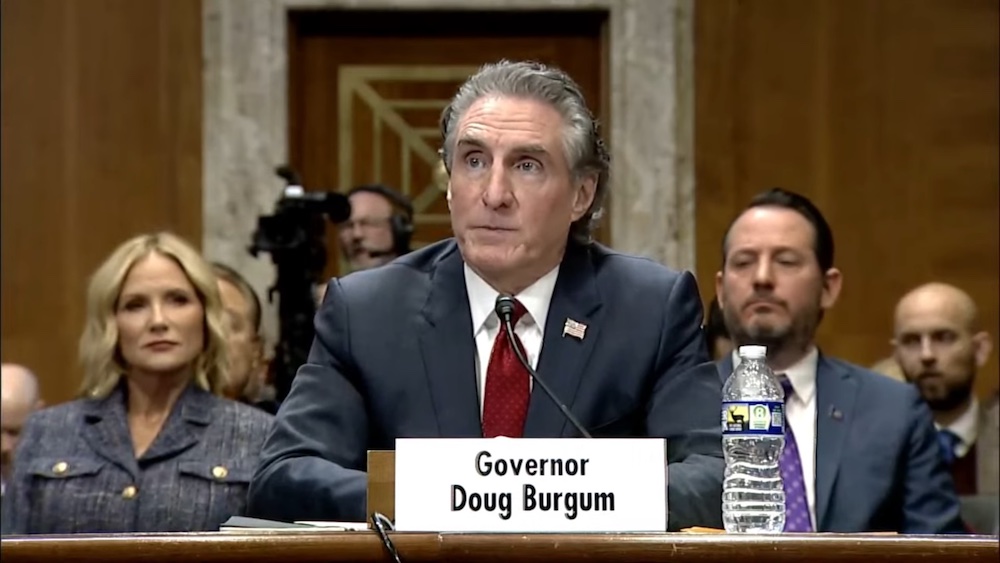
- Details
- By Neely Bardwell
Native relations emerged as a central focus of North Dakota Gov. Doug Burgum's Senate confirmation hearing Wednesday for Secretary of the Interior, where he pledged to uphold the government-to-government relationship with tribes through consultation on issues like public land management.
If confirmed, Burgum would oversee federal programs affecting tribal nations through the Bureau of Indian Affairs and Bureau of Indian Education, while also managing 500 million acres of public lands — much of it ancestral tribal territory — along with federal wildlife programs and national parks and monuments.
As North Dakota’s governor, Burgum developed relationships with the state’s five tribes. Though tensions arose over his handling of the Dakota Access pipeline protests, he established regular dialogue with tribal leaders, including the Standing Rock Sioux Tribe.
Sen. Martin Heinrich (D-N.M.), ranking member of the Senate Committee on Energy and Natural Resources, urged Burgum to maintain tribal consultation before making any changes to conservation designations presently in place. Heinrich requested Burgum meet with him and local leaders before making changes affecting New Mexico.
“We'd look forward to those discussions with you and, I think, again, as you've described, the key to this is the local consultation,” Burgum said. “My experience as governor and working with the tribes and working with local communities in North Dakota, whether it's grazing associations, county commissioners, mayors, rural residents, I think the consultation is key.”
During the hearing, Burgum highlighted the crisis of missing and murdered Indigenous women, calling it an “unseen tragedy.”
“It seems that we lose a college student at spring break, it’s a Netflix series and the whole nation knows her name personally. And then we have the same individual tragedies that happen over and over again in Indian Country, and people aren’t even aware that it’s going on,” Burgum said in response to questioning from Sen. Ruben Gallego (D-Ariz.) about federal collaboration with tribal law enforcement. “We’ve got to change our entire approach to this.”
On energy policy, Burgum voiced his alignment with President-elect Trump’s expanded policy to “Drill, baby, drill.” He framed fossil fuel production as crucial for competing with China on artificial intelligence development, despite concerns from Democratic senators about climate change.
“We know we have the technology to deliver clean coal,” Burgum said. “We’re doing that in North Dakota. This is critical to our national security. Without baseload we’re going to lose the AI arms race to China. And if we lose to China that has a direct impact on our national security.”
Tribal leaders and lawmakers expressed support for Burgum’s nomination before and after the hearing.
In the weeks following his nomination, he received strong support from tribal leaders in his home state of North Dakota, as well as neighboring South Dakota. He also received backing from the Navajo Nation, where President Buu Nygren praised Burgum’s experience and commitment to strengthening government-to-government relationships with tribes. The Great Plains Tribal Chairmen’s Association strongly endorsed Governor Burgum in an email to Native News Online on Thursday.
Senator Lisa Murkowski, chair of the Senate Committee on Indian Affairs, expressed strong support for Burgum through a spokesperson.
“The Department of the Interior – and in turn the Secretary who leads it – both play a tremendous role in Indigenous communities across the United States,” a representative from her office told Native News Online. “Governor Burgum has publicly expressed and demonstrated a commitment to good engagement with Tribes, the importance of the government to government relationship, and ensuring the federal government honors its obligations to Native peoples.
“He also understands the tragic history and impact of the many broken promises and treaties with Tribes and has noted that federal agencies need to do better. Senator Murkowski is looking forward to having a good partner on Indian Affairs priorities.”
More Stories Like This
Native News Weekly (August 25, 2024): D.C. BriefsUS Presidents in Their Own Words Concerning American Indians
Tlingit & Haida Launch New Foundation to Support Education, Wellness
Michigan Attorney General Opens Criminal Investigation into Indian Boarding Schools
Next on Native Bidaské: Julian Brave NoiseCat on the Lumbee Nation’s 140-Year Fight for Federal Recognition
Help us defend tribal sovereignty.
At Native News Online, our mission is rooted in telling the stories that strengthen sovereignty and uplift Indigenous voices — not just at year’s end, but every single day.
Because of your generosity last year, we were able to keep our reporters on the ground in tribal communities, at national gatherings and in the halls of Congress — covering the issues that matter most to Indian Country: sovereignty, culture, education, health and economic opportunity.
That support sustained us through a tough year in 2025. Now, as we look to the year ahead, we need your help right now to ensure warrior journalism remains strong — reporting that defends tribal sovereignty, amplifies Native truth, and holds power accountable.
 The stakes couldn't be higher. Your support keeps Native voices heard, Native stories told and Native sovereignty defended.
The stakes couldn't be higher. Your support keeps Native voices heard, Native stories told and Native sovereignty defended.
Stand with Warrior Journalism today.
Levi Rickert (Potawatomi), Editor & Publisher


